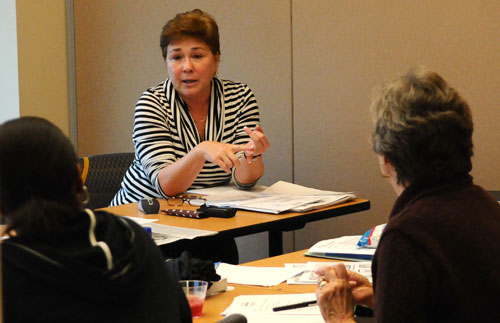VNA program teaches caregivers how to care for others—and themselves


Lisa Burchfield had lived with her mother her entire life—and yet she had never felt so alone.
Her mom has Parkinson’s disease, as well as dementia. Burchfield is her caregiver, the person who schedules appointments, takes her to the doctor, makes sure she takes her medications and manages the many tasks each day that help keep her mom safe and well.
“Every day there is a new challenge, something that I have to take care of,” she says. “It can be overwhelming.”
Burchfield and others who are primary caregivers receive essential information on services and support through Christiana Care’s Caregiver Series, a three-session lifeline for people drowning in a sea of physical, emotional and financial turmoil.
“We all know taking care of little kids is hard,” says Honey Woods, RN, manager of the Evergreen Center for Alzheimer’s Disease Treatment at the Christiana Care Visiting Nurse Association. “Taking care of a loved one with Alzheimer’s or cancer or any other serious disease is 100 times more difficult.”
Christiana Care VNA has been a trusted resource in the community since 1922, providing skilled nursing care, home health aides, physical therapy, occupational therapy, speech therapy and medical social workers.
Woods identifies with the people who attended a recent Caregivers Series at the John H. Ammon Medical Educational Center at Christiana Hospital. She cared for both her elderly parents at home, as well as a brother who lost his sight and one leg to diabetes.
The Caregivers Series provides such practical guidance as how to prevent pressure sores, avoid falls in the home, manage medications and navigate the Medicare system. Caregivers learn such fine points as how to prevent respiratory-tract infections and to choose shoes with Velcro closures to make it easier to dress someone with a disability.
Based on the book “The Comfort of Home: A Complete Guide for Caregivers,” the series is presented at Christiana Care locations throughout the state. Caregivers also are encouraged to look after themselves.

Caregivers learn how to manage challenging situations
Lori Montague is caring for her mother, who is in the final stages of cancer.
“On that 40-minute drive home from work, I cry,” she says. “As soon as I walk in the door, I start getting pills together.”
Woods says it is important for caregivers to schedule a break outside the home.
“You might ask a friend or someone from church to sit with your loved one so you can get your hair done,” she says.
Burchfield mounts written instructions for her mother, such as “TURN OFF LIGHTS” in bright, yellow, magnetic picture frames that stick to metal doors.
Lately, her mom has begun to ignore the messages. Burchfield believes that is because her mother has grown accustomed to the signs.
Woods suggests shifting the position of the signs so they will get her mom’s attention.
“You also might want to change the color,” she says. “Lime green? Shocking pink?”
For the past 13 years, Sue Larsen has been caring for her husband, who suffered damage to his spinal cord.
“It’s been very helpful to learn about things like the power of attorney and elder law,” she says.
Yolanda Mohammed, an only child whose mother is in a nursing home in New York, wants to bring her mom to Delaware. She says the information she received from the Christiana Care VNA program put her on the right track.
“All this is extremely complicated and it’s so good to talk with someone who really understands the system,” she says.
Burchfield says she is now reaching out to her brothers to lend a hand in caring for her mother.
“This program has taught me that I’m not alone,” she says. “For the very first time, I can ask for help.”